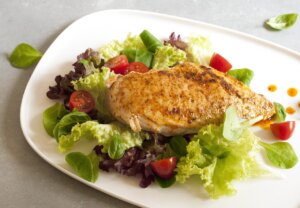We are please to bring you this post courtesy of Jo Tabor
Sports Nutrition: An Overview
Exercising and training are important. But have you thought about the fuel behind your training? It is important to remember that you cannot exercise or train without proper nutrition. It is a lot like if you do not put the proper gasoline in your vehicle. If you put diesel in an unleaded vehicle, it will clog up like none other. Think of improperly fueling your training like diesel in an unleaded. Balance is everything. You need proper balance in your diet to make sure that you are getting the right nutrients in the right amounts at the right time. But first you need to know what the nutrients are that you need and how much and when you need them.

Macro and Micro Nutrients
Macro-nutrients are major nutrients in your diet. These are your carbs, fats, and proteins. Each of these offers your body something different in the way of fuel. Carbs are the body’s main source of fuel. Carbs give you energy and help you keep going, especially during cardio and endurance training. The generally recommended daily intake of carbs for athletes is around 5-12 g/kg. (5,1) However, carbs burn out quickly. Protein helps build muscle and helps sustain you in the longer term. The generally recommended daily intake of protein for athletes is around 1-2 g/kg. (1) Fats help satiate and satisfy you. Fats are also good to support cell membranes and aid in the absorption of certain fat-soluble vitamins. (1) The general recommendation is to keep your fat intake to about 10% or less of your daily calorie intake. (1) All of these play an important role and they all deserve a place in your diet in proper quantities. Micro-nutrients are your vitamins and minerals and other natural chemicals in your diet. Most of your micro-nutrients are going to come from things such as vegetables and fruits.
Timing
You also need to think about when you are ingesting your nutrients. Protein is important before and after your workout. Before a workout it helps to also add carbohydrates to provide energy to get through the session. If your workout is more than an hour-long and at an intense, it might be a good idea to get in some fueling every 15-20 minutes or so. (5) One thing that is important to note here is that you need to make sure you get plenty of protein throughout the day as well. Evenly spacing your protein throughout the day is the most ideal. (5) The time of day that you eat your meals is important as well. There is evidence to suggest that eating the majority of your daily calories in the earlier part of the day may help control weight better than eating the majority later in the day. (5)
Probiotics and Supplements
Probiotics are microorganisms that confer many health benefits on the host. (4) These are the gut-friendly bugs. These microorganisms help both your digestive and immune systems. Probiotics can also help improve recovery after training sessions. (4) There are also certain strains of certain microorganisms that can help the gut better absorb important key nutrients. (4) This is important because the athlete needs all the nutrients they can get in order to perform to the best of their abilities. Probiotics can occur naturally in your diet or they can be supplemented as can many other things. Nutrients that you get in your diet are, of course, more potent and bio-available. Bio-availability simply means the ability of the body to process and use the nutrients that you ingest. However, if you find yourself in a rut with nutrition a good supplement may be a good way to bridge the gap.

You cannot train well if you are not fueling well. Nutrition is an often forgotten, but extremely important part of your training. If you do not have the right fuel you can very easily end up crashing and burning. You will not have the energy to continue. You will injure yourself more. Your performance will not be at it’s best. You may very well find yourself falling behind on your goals. And it will all boil down to simple nutrition. This can all be avoided if you consider your nutrition and avoid putting diesel in your unleaded.

About Jo- She is an ACE Certified Personal Trainer and a TaijiFit Certified Tai Chi Instructor. She grew up playing soccer, basketball, tennis, and doing cheerleading and gymnastics. Jo learned early on the love of a healthy and active life and how great it feels to be fit and healthy, and now wants to share that with other people.
Check out Jo’s Instagram here
Resources:
1. Thomas DT, Erdman KA, Burke LM. American College of Sports Medicine Joint Position Statement. Nutrition and Athletic Performance [published correction appears in Med Sci Sports Exerc. 2017 Jan;49(1):222]. Med Sci Sports Exerc. 2016;48(3):543‐568. doi:10.1249/MSS.0000000000000852 2. Thomas DT, Erdman KA, Burke LM. Position of the Academy of Nutrition and Dietetics, Dietitians of Canada, and the American College of Sports Medicine: Nutrition and Athletic Performance [published correction appears in J Acad Nutr Diet. 2017 Jan;117(1):146] J Acad Nutr Diet. 2016;116(3):501‐528. doi:10.1016/j.jand.2015.12.006 3. Kreider RB, Kalman DS, Antonio J, et al. International Society of Sports Nutrition position stand: safety and efficacy of creatine supplementation in exercise, sport, and medicine. J Int Soc Sports Nutr. 2017;14:18. Published 2017 Jun 13. doi:10.1186/s12970-017-0173-z 4. Jäger R, Mohr AE, Carpenter KC, et al. International Society of Sports Nutrition Position Stand: Probiotics. J Int Soc Sports Nutr. 2019;16(1):62. Published 2019 Dec 21. doi:10.1186/s12970-019-0329-0 5. Kerksick CM, Arent S, Schoenfeld BJ, et al. International society of sports nutrition position stand: nutrient timing. J Int Soc Sports Nutr. 2017;14:33. Published 2017 Aug 29. doi:10.1186/s12970-017-0189-4 6. eukendrup AE. Periodized Nutrition for Athletes. Sports Med. 2017;47(Suppl 1):51‐63. doi:10.1007/s40279-017-0694-2

